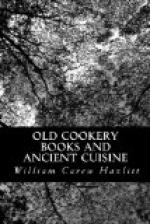It was to the hunting tribes, who came to us from regions even bleaker and more exacting than our own, that the southern counties owed the taste for venison and a call for some nourishment more sustaining than farinaceous substances, green stuff and milk, as well as a gradual dissipation of the prejudice against the hare, the goose, and the hen as articles of food, which the “Commentaries” record. It is characteristic of the nature of our nationality, however, that while the Anglo-Saxons and their successors refused to confine themselves to the fare which was more or less adequate to the purposes of archaic pastoral life in this island, they by no means renounced their partiality for farm and garden produce, but by a fusion of culinary tastes and experiences akin to fusion of race and blood, laid the basis of the splendid cuisine of the Plantagenet and Tudor periods. Our cookery is, like our tongue, an amalgam.
But the Roman historian saw little or nothing of our country except those portions which lay along or near the southern coast; the rest of his narrative was founded on hearsay; and he admits that the people in the interior—those beyond the range of his personal knowledge, more particularly the northern tribes and the Scots—were flesh-eaters, by which he probably intends, not consumers of cattle, but of the venison, game, and fish which abounded in their forests and rivers. The various parts of this country were in Caesar’s day, and very long after, more distinct from each other for all purposes of communication and intercourse than we are now from Spain or from Switzerland; and the foreign influences which affected the South Britons made no mark on those petty states which lay at a distance, and whose diet was governed by purely local conditions. The dwellers northward were by nature hunters and fishermen, and became only by Act of Parliament poachers, smugglers, and illicit distillers; the province of the male portion of the family was to find food for the rest; and a pair of spurs laid on an empty trencher was well understood by the goodman as a token that the larder was empty and replenishable.
There are new books on all subjects, of which it is comparatively easy within a moderate compass to afford an intelligible, perhaps even a sufficient, account. But there are others which I, for my part, hesitate to touch, and which do not seem to be amenable to the law of selection. “Studies in Nidderland,” by Mr. Joseph Lucas, is one of these. It was a labour of love, and it is full of records of singular survivals to our time of archaisms of all descriptions, culinary and gardening utensils not forgotten. There is one point, which I may perhaps advert to, and it is the square of wood with a handle, which the folk in that part of Yorkshire employed, in lieu of the ladle, for stirring, and the stone ovens for baking, which, the author tells us, occur also in a part of Surrey. But the volume should be read as a whole. We have of such too few.




